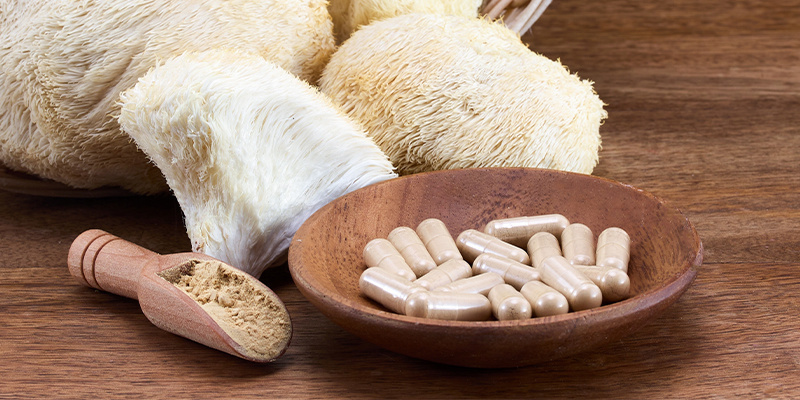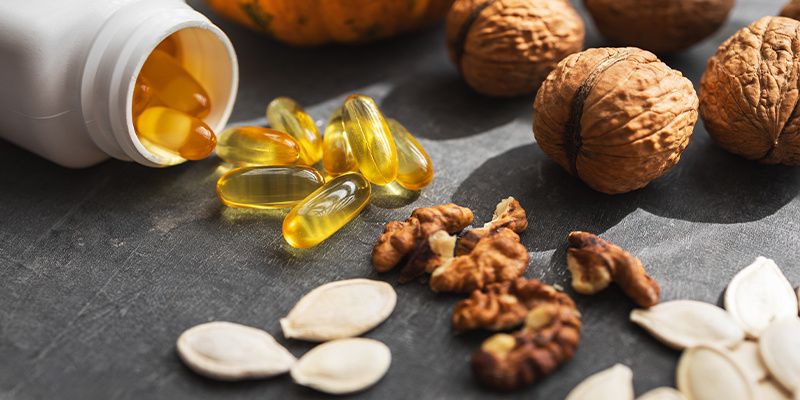Top 7 nootropics to boost mental performance
Nootropics occur in nature and can also be synthesised in labs. But with so many options, finding the right one isn't easy. Discover our 7 top picks to support memory and focus.
Life is tiring, and it can feel overwhelming at some points. While finding balance is essential, having the right tools can give us an edge when we need it. Given that, it’s no surprise that the global nootropics market is booming. More people are turning to nootropics for mental performance—natural or synthetic substances that claim to enhance brain function.
In this article, we’ll explore what nootropics are, how they work, and most importantly, the top 7 natural and synthetic nootropics for memory, focus, and clarity—each backed by research and widely used by individuals seeking to support cognitive performance naturally.
What are nootropics?

The term “nootropic” was coined in 1972 by Romanian psychologist and chemist Dr Corneliu Giurgea. It combines the Greek words nous (mind) and trepein (to bend), referring to substances that can influence and enhance mental function. Importantly, nootropics are not necessarily drugs; they need not be psychoactive.
At the core of Dr Giurgea’s definition was the idea that a true nootropic should not only enhance cognition but also protect the brain and support its long-term health. According to his criteria, a nootropic must enhance learning and memory, improve resistance to disruptive conditions (such as stress or fatigue), facilitate interhemispheric communication, and demonstrate minimal side effects or toxicity.
These parameters have since been broadened, but they still serve as a useful framework for distinguishing true cognitive enhancers from mere stimulants.
Nootropics fall into two broad categories:
- Natural nootropics: Such as herbs, mushrooms, and amino acids
- Synthetic nootropics: Including lab-formulated compounds like racetams or modafinil
Each type has its own advantages. Natural nootropics are often praised for their gentle, cumulative effects and have been used for centuries in traditional systems such as Ayurveda and Traditional Chinese Medicine. They typically cause fewer side effects and are generally well tolerated over time.
Synthetic nootropics, on the other hand, can offer more immediate and pronounced effects, often by directly influencing neurotransmitter systems or altering brain wave activity. However, their safety profiles and long-term effects may not be as well-established.
Many of the best natural nootropics for cognitive enhancement have been used in traditional holistic systems for centuries, and modern research continues to validate their potential.
How nootropics improve mental performance

The most common reasons people take nootropics include:
- Memory enhancement: Supporting retention and recall, especially under pressure
- Focus and concentration: Reducing mental distractions for sustained attention
- Mental clarity: Improving information processing and mental endurance
Nootropics work through a variety of biological pathways to support these outcomes. Some stimulate the release or uptake of key neurotransmitters—chemical messengers that transmit signals between neurons.
For example, acetylcholine is closely linked to learning and memory, while dopamine and norepinephrine play key roles in attention, motivation, and executive function. Certain nootropics help regulate these systems, leading to improved cognitive performance in both short-term tasks and long-term learning.
Other nootropics improve blood flow and oxygen delivery to the brain, which is essential for maintaining energy levels during mentally taxing activities. Enhanced circulation ensures that the brain receives an adequate supply of glucose and oxygen—its primary sources of fuel—supporting sustained mental output and sharper focus.
Another key mechanism is the reduction of oxidative stress—a state in which free radicals damage brain cells and impair cognitive function. Antioxidant-rich nootropics such as Bacopa monnieri or Ginkgo biloba help neutralise these harmful compounds, supporting overall brain health and protecting against age-related decline.
Recent research continues to support these mechanisms. For example, a 2022 review in Nutrients highlighted a range of nootropics that have demonstrated the ability to support executive function, learning, and working memory, particularly through their influence on synaptic plasticity, mitochondrial function, and anti-inflammatory pathways (Malík & Tlustoš).
The review concluded that while individual responses can vary, many nootropics show strong potential as cognitive enhancers when used consistently and responsibly.
Top 7 nootropics to boost mental performance

So if you’re interested in taking nootropics, we’re here to help. There are countless options to choose from, and many come with bold claims about transforming your cognitive performance. It’s easy to feel overwhelmed by all the choices, so here we’ve narrowed it down to seven options that are widely used around the world.
Caffeine + L-theanine
Caffeine is the world’s most consumed psychoactive substance, but pairing it with L-theanine—an amino acid found in green tea—offers a smoother, smarter boost. While caffeine increases alertness, L-theanine promotes soothing sensations without sedation, helping to counterbalance potential overstimulation.
Studies show this combination enhances focus, reduces reaction time, and supports working memory—ideal for studying or high-pressure tasks.
Benefits:
- Enhances sustained attention and reaction speed
- Reduces tension and mental fatigue
- Improves cognitive performance without overstimulation
Bacopa monnieri

A staple in Ayurveda, Bacopa monnieri is prized for its potential to enhance memory and learning. It works by modulating neurotransmitters and protecting against oxidative stress in the brain.
Clinical studies show that consistent use (often over 6–12 weeks) may improve cognitive processing and memory recall, particularly under stressful conditions (Kumar, 2016).
Benefits:
- Improves memory retention and verbal learning
- Contains powerful antioxidants
- May be of interest to those with ADHD
Rhodiola rosea
Known as an adaptogen, Rhodiola helps the body manage tension and maintain mental performance during fatigue. Native to cold regions of Europe and Asia, it’s traditionally used to boost endurance and resilience.
A 2022 study by Stojcheva et al. found that Rhodiola may help reduce burnout, elevate mood, and support concentration—especially in mentally taxing situations (Stojcheva).
Benefits:
- Combats stress-induced fatigue
- Enhances focus and cognitive function
- Supports mood balance and mental energy
Lion’s mane mushroom

Lion’s mane (Hericium erinaceus) is a mushroom that has long been used in traditional holistic practices in Asia. It is thought to stimulate the production of nerve growth factor (NGF), which is crucial for neuron growth and repair.
Early human and animal studies suggest lion’s mane can support neurogenesis and improve symptoms of mild cognitive impairment, while also supporting mental clarity and a balanced mood (Docherty, 2023).
Benefits:
- Promotes brain cell regeneration
- Enhances cognitive performance and clarity
- May reduce mental tension and low mood
Omega-3 fatty acids

Omega-3s, particularly EPA and DHA, are essential for maintaining brain structure and function. These healthy fats are vital for communication between brain cells and may prevent age-related cognitive decline.
Found in oily fish and supplements, omega-3s are among the safest nootropics for daily use, with potential benefits for memory, mood, and more (Lundbergh, 2022).
Benefits:
- Supports long-term brain function and memory
- Impacts inflammation and oxidative stress
- May enhance mood and cognitive flexibility
Ginkgo biloba
One of the oldest living tree species, Ginkgo has long been used to improve mental sharpness. It increases cerebral blood flow and acts as a neuroprotective antioxidant.
A 2014 study found Ginkgo biloba to be particularly beneficial for older adults, but also for improving memory and processing speed in younger, healthy individuals (Franke).
Benefits:
- Enhances blood circulation to the brain
- Improves memory and executive function
- Reduces mental fatigue and fog
L-Tyrosine
L-Tyrosine is an amino acid precursor to dopamine and norepinephrine—key neurotransmitters for focus, motivation, and mental resilience.
It’s especially effective under stress, such as during exams or demanding workdays, helping to maintain cognitive performance and reduce brain fog (Jongkees, 2015).
Benefits:
- Sharpens focus and short-term memory
- Supports neurotransmitter synthesis
- May help the brain adapt to cognitive stress
Potential side effects and safety

While many nootropics are safe for daily use, side effects may occur, particularly if taken in high doses or from unreliable sources. Common reactions include:
- Headaches or digestive upset
- Insomnia (especially with stimulants like caffeine)
- Irritability or anxiety
To minimise risk:
- Start with low doses
- Avoid combining too many substances at once
- Consult a healthcare provider, especially if you’re taking medication
- Quality and dosage are key—opt for well-reviewed, third-party tested products
How to choose the right nootropic

Selecting the right nootropic depends on your individual goals. Consider the following:
- Focus or memory? Choose L-theanine + caffeine for focus, or Bacopa for memory
- Natural vs. synthetic? Natural options tend to have fewer side effects
- Short-term or long-term use? The effects of some nootropics build over time (e.g. lion’s mane)
Look for reputable brands—such as our own—that prioritise purity, sourcing, and transparency. Reading user reviews and scientific literature can also guide your decision.
Ultimately, nootropics work best as part of a holistic approach. When paired with healthy habits like sleep, nutrition, exercise, and mindfulness, nootropics may support your full mental potential.
- Bjørn Lundbergh, Ann Sofi Enevoldsen, Ken D. Stark, Christian Ritz, & Lotte Lauritzen. (2022, December). Fish oil supplementation may improve attention, working memory and attention-deficit/hyperactivity disorder symptoms in adults with autism spectrum disorder: a randomised crossover trial - https://www.cambridge.org
- Docherty, S., Doughty, F. L., & Smith. (2023). The Acute and Chronic Effects of Lion's Mane Mushroom Supplementation on Cognitive Function, Stress and Mood in Young Adults: A Double-Blind, Parallel Groups, Pilot Study. Nutrients - https://www.mdpi.com
- Franke, Andreas G., Heinrich, Isabel, Lieb, Klaus, Fellgiebel, & Andreas. (2014, February). The use of Ginkgo biloba in healthy elderly - https://link.springer.com
- Ivanova Stojcheva, E., & Quintela, J. C. (2022). The Effectiveness of Rhodiola rosea L. Preparations in Alleviating Various Aspects of Life-Stress Symptoms and Stress-Induced Conditions-Encouraging Clinical Evidence - https://www.mdpi.com
- Jongkees, B. J., Hommel, B., Kühn, S., & Colzato. (2015/11/01). Effect of tyrosine supplementation on clinical and healthy populations under stress or cognitive demandsâA review - https://www.sciencedirect.com
- Kumar, N., Abichandani, L. G., Thawani, V., Gharpure, K. J., Naidu, M. U. R., & Venkat Ramana, G. (2016). Efficacy of Standardized Extract of Bacopa monnieri (Bacognize®) on Cognitive Functions of Medical Students: A Six-Week, Randomized Placebo-Controlled Trial. Evidence-Based Complementary and Alternative Medicine - https://onlinelibrary.wiley.com
- Malík, M., & Tlustoš, P. (2022). Nootropics as Cognitive Enhancers: Types, Dosage and Side Effects of Smart Drugs - https://www.mdpi.com
-
 3 min
3 December 2024
Mindscopic: Innovation Meets Natural Ingredients
Discover Mindscopic, an innovative brand in the nootropics market. Here we explore their high-quality supplements, which can be seamlessly integrated into your daily routine to potentially enhance...
3 min
3 December 2024
Mindscopic: Innovation Meets Natural Ingredients
Discover Mindscopic, an innovative brand in the nootropics market. Here we explore their high-quality supplements, which can be seamlessly integrated into your daily routine to potentially enhance...
-
 4 min
19 August 2022
7 Natural Aphrodisiacs For Women
Sometimes our sex drive needs a little boost. And if we can do so using natural substances, that's all the better. Here we look at 7 natural aphrodisiacs that may help women to increase their...
4 min
19 August 2022
7 Natural Aphrodisiacs For Women
Sometimes our sex drive needs a little boost. And if we can do so using natural substances, that's all the better. Here we look at 7 natural aphrodisiacs that may help women to increase their...
-
 5 min
7 February 2022
What Are Nootropics And How Do They Work?
In a world where it feels like every moment counts, we're often worried about missing crucial information or not performing at our best, especially in a work or education environment. This is where...
5 min
7 February 2022
What Are Nootropics And How Do They Work?
In a world where it feels like every moment counts, we're often worried about missing crucial information or not performing at our best, especially in a work or education environment. This is where...
-
 1 min
26 July 2018
Meet Hawaiian Baby Woodrose: A Natural Psychedelic
LSA is an increasingly popular hallucinogen, and Hawaiian Baby Woodrose seeds are one of the best legal ways to get it. So what exactly are they?
1 min
26 July 2018
Meet Hawaiian Baby Woodrose: A Natural Psychedelic
LSA is an increasingly popular hallucinogen, and Hawaiian Baby Woodrose seeds are one of the best legal ways to get it. So what exactly are they?






 United States
United States












